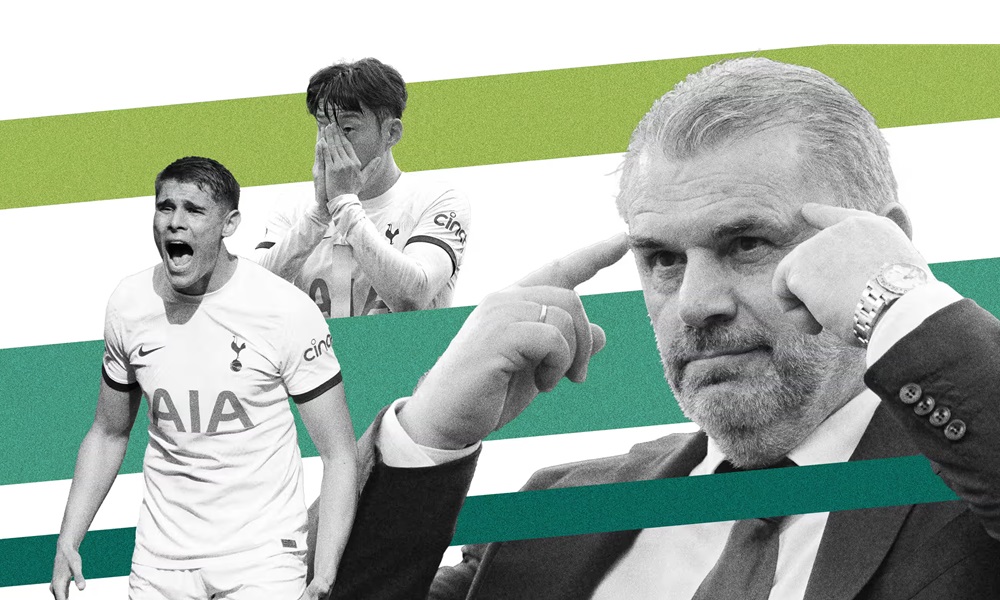The good news for Tottenham is that they did not concede a goal from a set play against Liverpool on Sunday. But there wasn’t much else. A 4-2 defeat meant they had lost four successive league games for the first time since 2004 and if Tottenham are to clinch fourth place from Aston Villa, they have to win their remaining three games, one of which is against Manchester City, and hope that Villa don’t win either of their two.
A measure of perspective is essential. Spurs finished eighth last year and the season ended in rancour and recrimination. Antonio Conte had left at the end of March, by which point he had made clear he didn’t much want to be at the club, while fans had tired of his grindingly negative football; what can be tolerated when it’s bringing results soon palls when those results dry up.
Ange Postecoglou is different, not just from Conte but from most coaches. He sounds like a human. He can be tetchy but he doesn’t go in for orchestrated rants. At 58, this is by far the highest level at which he has coached; this could be the culmination of a life’s work that took him from Australia to Japan to Celtic. For Postecoglou, this is not just another couple of years on the CV. This is his legacy. He wants, desperately, to be at Spurs. The attitude is refreshing, and so initially, was the football. His Spurs have attacked, recklessly so at times. He took 26 points from his first 10 league games in charge. Nobody really thought Spurs could win the title, but a quarter of the way through the season they were top.
There was always going to be a reset. That sort of form was never sustainable. After 2.6 points a game for 10 games, they have taken 1.36 from the next 25. Newcastle, Chelsea and Manchester United feel ominously close. They hit last season’s points tally on 7 April, and haven’t picked up another one since. Given the sale of Harry Kane last summer, a new manager, a revolution, Tottenham would surely have happily accepted 60 points at this stage with a restored sense of fun; the problem is the order. Everything since the end of October has felt like drift.
The first grumblings against Postecoglou have begun. His stubbornness regarding set pieces seems bizarre. “I don’t see it as an issue,” he said after conceding twice to corners in the north London derby last weekend, which made it inevitable that Spurs would concede to a header from a set piece against Chelsea on Thursday. His side have now conceded 16 goals to set pieces this season; as a proportion of total goals conceded, only Nottingham Forest have a worse record.
What Postecoglou was surely saying was not that he didn’t think set plays were worth bothering about but rather that if Spurs were to bridge the gap to the Champions League qualifiers, it wasn’t going to be by getting better at defending corners but improving their general pattern of play. That’s a far more understandable position than pretending set plays don’t matter but, still, imagine that figure of 16 conceded could be halved: how many more points would that have brought? Probably enough to make the race with Villa for the top four neck and neck.
The bigger issue, though, as Postecoglou said, is probably the other area in which he is dogmatic, which is in playing a high-tempo, high-possession game. Liverpool, despite their recent stumble remain the most aggressive pressing side in the Premier League, while Tottenham have conceded possession in their defensive third more than any other team. That this patched-up, low-confidence version of Tottenham might struggle at Anfield, a ground where their recent record is terrible, was predictable. In such circumstances, may it not be worth a coach compromising on his principles just a little, on not simply insisting that’s the way we play, mate?
That elides with a general openness – nine sides in the Premier League have conceded fewer goals than Spurs – to create a concern that Postecoglou has given fans their Tottenham back all too precisely, that the best they can ever be under him is an occasionally thrilling team who are generally good to watch, but too open ever to really challenge for titles.
The improvement from a year ago, though, shouldn’t be forgotten. There are caveats but given the turmoil of last summer, it’s only fair to give Postecoglou at least one more window before passing too firm a judgment. The squad still lacks a little depth and is not yet fully designed for the sort of football he wants to play. Postecoglou’s problem is that those caveats loom larger because of the recent downturn. The season as a whole has been promising but the end has been disappointing. The issue now is to prove that he was the reason for the early season bounce, rather than just the absence of Conte.








More Stories
Amorim insists Fernandes not leaving Manchester United amid Madrid reports
How debt burden pushed Nigerian boxer Segun Olanrewaju to a fight that took his life
Nigeria Taekwondo Federation boss, Abdullahi Saidu dies at 53